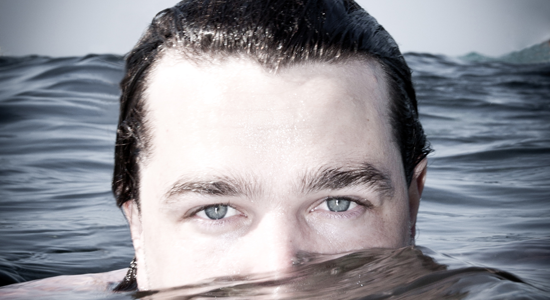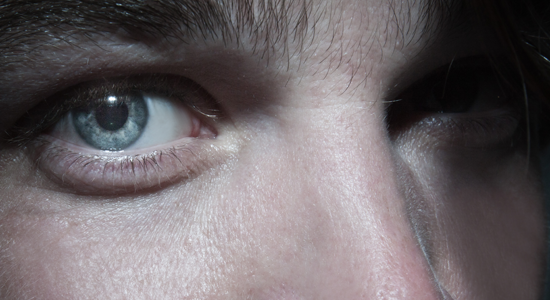
Una chiacchierata con David Wolstencroft, dj e produttore di Manchester. Conosciuto ai più per gli LP Working Nights e In the Red pubblicati con il moniker Trus’me, David è anche il fondatore della label Prime Numbers e della D3K. A Soundwall racconta del suo background e dei nuovi progetti.
Ciao David, benvenuto su Soundwall. Come procede?
Non mi posso lamentare. Mi trovo nella mia nuova casa, a Singapore. Fuori ci sono 31 gradi. Ho appena finito di mangiare un delizioso piatto locale – riso e pollo cucinati con lo zenzero. Ora sono davanti al computer, pronto per l’intervista, con un succo di lime appena spremuto.
Recentemente hai lanciato un nuovo progetto, 1 Red Light, e hai cambiato aka. Cosa dobbiamo aspettarci da David James?
David James è il mio nuovo alias techno. Le feste 1redlight sono partite nel 2011 al Sonar. Altre feste 1redlight si sono tenute al Movement, a Torino, a New York e a Minneapolis. A natale ho suonato all’Avalon di Singapore insieme a Ben Klock e lì ho proposto il mio nuovo sound: techno robusta ed essenziale, un distacco netto dalla deep house morbida e tinta di funk che facevo con il mio vecchio moniker. Qui potete ascoltare il set. Era un percorso che avevo già iniziato l’anno scorso, annunciando che Ben Klock e Marcel Dettmann avrebbero remixato del vecchio materiale di Trus’me.
Quando hai deciso di creare Prime Numbers, la tua etichetta?
Se vuoi avere pieno controllo e fare uscire qualcosa di cui essere davvero orgoglioso, allora devi occupartene personalmente. Credo che questo principio valga per ogni tipo di attività. Quello che devi fare è creare le basi e stabilire la filosofia della label. Fatto questo, puoi assumere dei collaboratori e tornare a dedicarti alla tua musica
Qualche nuova uscita in arrivo?
In effetti si. Presto sarà operativo il nuovo sito della Prime Numbers e si aggiungeranno nuovi artisti, come Nick Sinna. Sono in arrivo anche dei remixes di alcune tracce di Trus’me, fatti da Terence Dixon, Marcel Dettmann, Norman Nodge, DVS1 e Matthew Johnson.
Gestisci anche anche un‘agenzia, la D3K (Disco 3000). Parlacene un po’.
Non è un’agenzia vera e propria, assomiglia più ad un’azienda. Lavoriamo a contatto diretto gli artisti, spinti da un’ideale comune, e cerchiamo di lanciare nuovi party all’interno dei festival. Volevo creare eventi che avrei potuto apprezzare non solo come dj, ma anche come cliente.
Parlaci del tuo background. Cosa ascoltavi da ragazzo?
Crescendo a Manchester entri in contatto con generi molto diversi. Diciamo che per me non era tanto questione di stili, quando di qualità. Ho incominciato ascoltando gruppi indie come Stone Roses e Blur, ad esempio, per passare all’hip hop. Mi piaceva molto anche il jazz. Poi ho scoperto la musica elettronica e me ne sono innamorato.
Come ti ha influenzato essere cresciuto a Manchester?
C’erano serate come l’Eyes Down in cui i dj mixavano di tutto, dal raggae alla techno. Un’influenza notevole sul mio modo di suonare e produrre. Mr Scruff ed Electric Chair erano serate perfette per ascoltare ottima elettronica. Anche Leeds ha lasciato un segno. Ci ho vissuto nel periodo universitario e devo dire che in quella città sanno come divertirsi.
Quando hai deciso di iniziare a produrre?
Ascoltavo Jay Dee/Dilla e collezionavo dischi jazz. Ero ossessionato dai samples e mi chiedevo come riuscissero ad ottenere quei suoni. Quando ho acquistato un MPC 60, ho realizzato che fare musica era quello che avrei voluto fare per il resto della mia vita.
Qual è il tuo set up di producer?
Mi piace definirmi “anoligital”. Per anni nel mio studio ho tenuto solo macchine, registrando centinaia di loop con la 909 ed il Pro One. Non ho bisogno di farne altri. Mi trovo molto bene con quello che sto utilizzando ora e riesco a fare cose che non avrei mai potuto realizzare con un set up esclusivamente analogico. Con il mio Spectrasonics posso integrare nuovi suoni, lo adoro, e con una scheda potente come la UAD solo, ti sembra di avere gli Abbeys Studios nel computer. L’utilizzo di controller midi per cambiare in tempo reale i parametri dell’esecuzione è fondamentale per ottenere un live feeling. Lavorare sugli arrangiamenti è qualcosa di meno diretto, bisogna sempre cercare di offrire ciò che uno non si aspetterebbe.
Puoi dirci 5 tracce che ti hanno influenzato in maniera particolare?
Più che da singole tracce, sono stato influenzato da alcuni LP, in particolare dal lavoro di produzione dietro ad ognuno di questi dischi. Jay Dee “Welcome To Detroit” è in assoluto il miglior album di hip hop mai realizzato, geniale. Moodymann “Forevernevermore” è incredibile, potrei ascoltarlo all’infinito senza mai stancarmi. Marvin Gaye “What’s Going On” è stato una guida mentre preparavo Working Nights, il mio primo LP. Poi “The Low End Theory” degli A Tribe Called Quest ed un set di Theo Parrish su Nova Radio. Mi ha aperto la mente, chi lo ha ascoltato può capirmi!
Un’ultima domanda. Se il mondo dovesse finire nel 2012, che disco vorresti suonare alla festa di fine mondo?
Sicuramente Marvin Gaye “What’s Going On”! Riesco ad immaginarmi tutta le gente del mondo riunita insieme a cantare.
English Version:

A chat with David Wolstencroft, dj and producer from Manchester. Widely known for the LP Working Nights and In the Red published with the moniker Trus’me, David is also the founder of the label Prime Numbers and of D3K. He tells Soundwall about his background and new projects.
Hi David, welcome on Soundwall. How you doing?
I can’t complain at all. It’s 31 degrees Celsius still at 10 pm here in Singapore, my temporary new home. I just finished a plate of chicken rice, a local tradition here cooked in ginger, yummy. Now sitting down to the interview with a freshly squeezed lime juice.
You’ve been up to a lot lately: you’ve launched your new project, 1 Red Light, and started focusing on techno, with a new aka. What can we expect to hear in David James’ sets?
David James is my new, techno-leaning alias. The party 1redlight concept began at Sonar 2011, then was part of the Movement festival in Torino, Italy and later to New York and as far as Minneapolis. On Christmas Day, the sounds of David James were showcased along side Ben Klock with a thumping set at Avalon Singapore, which you can stream here.
The robust, stripped back techno audible throughout the set marks a significant departure from the soul and funk-tinged deep house produced under my Trus’me moniker. We hinted at this new direction last year with a news piece revealing that techno cognoscenti Ben Klock and Marcel Dettmann had been commissioned to remix Trus’me material.
When did you decide you had to start your own label?
If you want to have full control and release something you are proud of then you have to do it yourself. I feel this is the principle with any business. Once the ethos and groundwork have been set up for the label then you can delegate work load and concentrate on your own music once again.
Do you have any upcoming releases we should be looking out for?
Plenty in fact, A new website shortly and new artistes like Nick Sinna plus remixes of previous Trus’me releases from Terence Dixion, Marcel Dettmann, Norman Nodge, DVS1, Mathew Johnson etc so 2012 is a new direction and a full on push with releases this year.
Tell us a bit about D3K, your agency?
It functions less as an agency and more like a business where we work with artists to throw concept parties at festivals. Again I just wanted to produce events that I would like both as a DJ and as a punter. It’s an open format, just the ideology of doing something correct in common in each event.
What about your background. What kind of music did you listen to growing up?
I was an Indie kid mainly, from Stone Roses to Blur. Being from Manchester you grow up hearing eclectic music. So music was very much genre less, I just liked good music. Later on hip hop and then Jazz was a major influence till I found electronic music that I fell in love with.
What was the music scene like growing up in Manchester?
You had nights such as Eyes Down eclectic Dj sets where they would mix in reggae dub to Techno back out to Brazilica it was a major influence in the way I DJ and produce. Then nights like Mr Scruff and Electric Chair you couldn’t help being exposed to good Electronic and world music. It was fun the whole way, although Leeds where I was at University, also was part of my genetic makeup. Some amazing party people live in that city.
What first got you into music and production?
Listening to Jay Dee/Dilla and just obsessed with samples, collecting jazz and thinking how do they do that. Buying an MPC 60 and realising when I sat down to make a beat, that this is what I want to do for the rest of my life.
What’s your current studio set up?
I’m anoligital I like to say. I’ve had the full analog studio for years and made hundreds of loops of 909’s and Pro One’set going through a gritty desk that I don’t really need to record any more. I like to work with what I have now and do something that just wouldn’t be possible in ananalog set up. I love my Spectrasonics to complement the sounds and the mighty UAD solo card is like having Abbey Studios in your computer. I keep it simple now, the key to making things sound live and real time is applying midi controllers to change parameters on the fly, working to bar arrangements is not real, try to present the unexpected.
Could you give us five tracks that have really influenced your music?
I’m gonna give you LPs as that really were what influenced me, how the whole LP was put together. Jay Dee – Welcome to Detroit is the best Hip Hop LP, its pure genius. MoodymannForevernevermore – wow wow wow it could loop for eternity and I would never get bored. Marvin Gaye What’s going On LP was my blue print to putting my first LP together “Working Nights’. A set by Theo Parrish on Nova radio just blew my mind, those who know, know! Tribe Called Quest – The Low End Theory introduced the whole Detroit Circle of music I can never leave.
One last question. If the world does end in 2012 what would you like to play at the end of the worldparty?
Marvin Gaye What’s going on of course! I can see the world singing in unity now.

